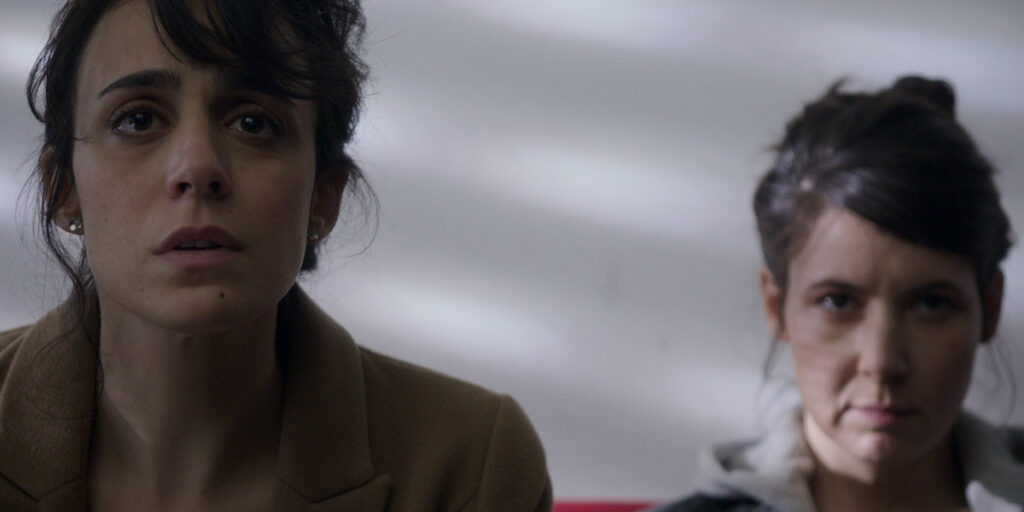A strong debut for Israeli writer/director Limor Shmila, “Montana” is not the usual type of story of a person coming back home after a loss. In this case, a woman named Efi (Noa Biron) returns to her hometown of Acre after a long time when her grandfather commits suicide. That very truth is one of many things unspoken in a group of people that includes Efi’s aunt and uncle, a family friend named Karen and Karen’s young daughter Maya. Living close to each other geographically and often shown spending time with each other, these people harbor secrets about who is sleeping with who, as expressed through the many silent gazes. Efi’s mother is out of the picture, and speaking in a phone call in one scene hints that she wants nothing to do with these people. Scene-by-scene as the secrets become more sordid, you start to understand why.
Meanwhile, Efi becomes romantically attached to Karen, who also happens to now live in Efi’s old childhood home. They start a connection that is intense but also creates high stakes for the secrets Efi uncovers, which could destroy this close-knit group of people. Shmila makes an effective slow burn of a domestic mystery movie as Efi pieces together the unspoken lives of these people, putting her nose into business that reflects her own experience from years ago.
The center of the story is Noa Biron, who gives a steely, fascinating performance akin to a hard-boiled detective, especially with every slow, contemplative drag of a cigarette that she takes. There’s a lot behind the way she looks with skepticism on these people while they fraternize, or how her connection with Karen is something that makes her electric but still quiet, contemplative. As Shmila builds the movie around Efi’s realizations (perhaps too gradually, early on), Biron is a compelling surrogate into this world where secrets have become normalized, and innocence was lost long ago.

“Kissing Candice” is a fluttering movie built on the idea of dreams, an ambition that can embolden or defeat filmmakers depending on their overall vision. This writer/director debut from Aoife McArdle is somewhere in the middle, as a story that has a wide vision but not a crucial sense of focus to make the substance shine over its style.
The dreamer in this case is a young woman in a small Irish town named Candice (Ann Skelly), who has Lynchian dreams, sometimes during her chronic seizures. In one, she has visions of a young man that comes to save her; they meet in a dimly lit lounge with red lighting, straight out of a “Twin Peaks” xerox. In reality, a person like this image appears but as a member of a ruthless gang that has brought terror to Candice’s town, and to her cop father. Meanwhile, the town has become emotionally cloudy with the recent disappearance of a young boy, whom Candice’s father has been investigating while trying to destroy the gang.
There are a lot of narrative pieces at work in this story, with Candice’s coming of age, the gang’s own existence on the fringe of rules and moral code, the story of the missing child and even the anxiety experienced by Candice’s father. McArdle then adds to this Candice’s dreamy sense, making the story run with more haze and less grit than these intense pieces might require. But these parts don’t always come together, despite moments of raw acting in which emotions are clear. There’s a particularly effective moment with one of the gang members in the laundromat, as he has a type of meltdown related to the missing boy. It’s the type of potency that could work alone as a short film, instead of taken in the context where McArdle’s narrative point-of-view feels too broad.
McArdle has a history of working in music videos, and more than usual that’s a background that becomes apparent when watching this movie. There are a great deal of arresting images that take full advantage of space, framing, light and color, but they don’t blend together tonally, even with the narrative framing of reality versus a dream-like state. It makes for an ambitious coming-of-age story with a developing vision put on shuffle.

From New Zealand comes the ambitious eight-piece project “Waru,” the culmination of eight Maori female directors (Briar Grace-Smith, Casey Kaa, Ainsley Gardiner, Katie Wolfe, Chelsea Cohen, Renae Maihi, Paula Jones, Awanui Simich-Pene) creating the same number of vignettes that are all single-take. The subject of focus is a community’s trauma when a young boy named Waru dies at the hands of an abusive caregiver. The cameras of these women provide snippets into different lives of those effected by the news: Waru’s teacher who is trying to pull herself together during a school day; a mother whose children went to school with him; his grandmothers who mourn him at a funeral service; two aunts who seek a form of vengeance; a Maori newscaster who makes a stand on live TV against racist discussions of Waru’s death and her culture. With its different perspectives, “Waru” creates a wide, special scope of its center tragedy.
Passion is a thrilling, guiding element to this film; the thematic dedication to exploring the Maori culture dealing with this grief is just the beginning. Most shorts play out with large casts and for roughly ten minutes, with actors pushed to exact cues and deep emotional places as we observe. It’s elements like this that make the film worth recommending even though the one-take notion doesn’t add anything more that some succinct editing could, or that the orchestration in some passages can be a bit rough around the edges. For a movie like “Waru,” which sincerely wants to grab viewers and make them listen to different experiences about something incredibly difficult, such ambition only makes the project more worthwhile.












